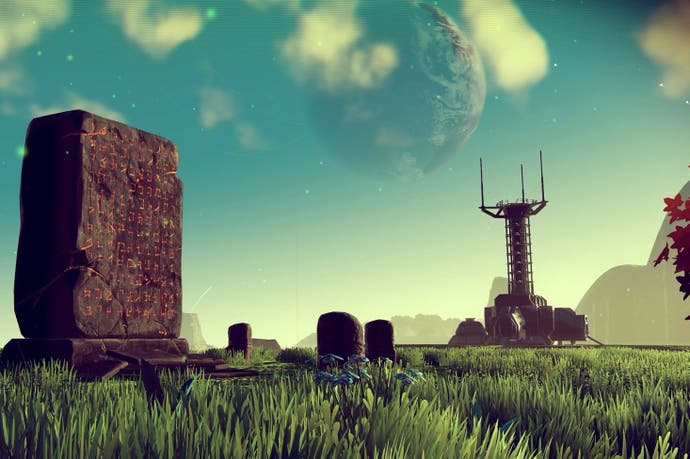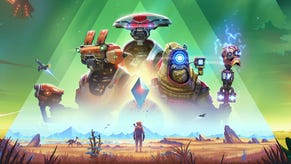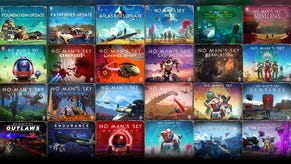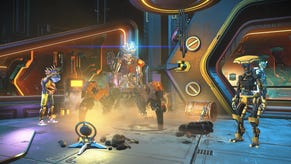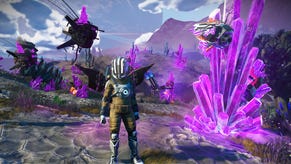No Man's Sky is a fine example of one type of game (but many people were expecting another)
Horse face, plate face.
I'm writing this a couple of days after the release of No Man's Sky. The incandescent vapour of Internet opinion is coalescing around a cooling core of critical consensus. I imagine that by the time you read this there will have been magmatic eruptions of violent dissent, an orbit of backlash and counter-backlash. The world's telescopes will have been trained on Sean Murray as he explains in defiant, melancholy interviews and blog posts why No Man's Sky is only exactly what everyone knew it would be: the world's most ambitious, expensive and beautiful walking simulator. Except you fly, of course. I'll come back to that.
So let me start out by saying I am not here to be mean about No Man's Sky. I spent a relaxed evening with it, I'll spend a few more, I don't regret the fifty quid I spent, I'm enormously impressed that such a small team pulled this off and my heart aches for them seeing five years of effort summarised as a 70 on Metacritic. Although I imagine it will bounce up a few points eventually, because this:
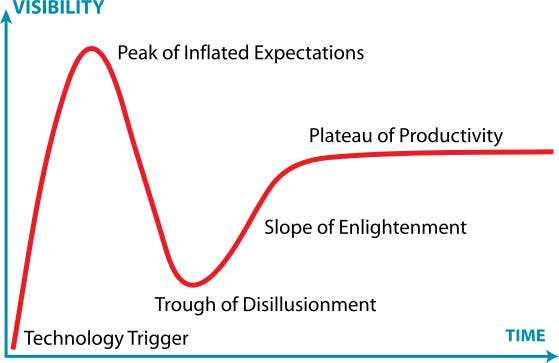
...which was always going to make August a difficult month for the devs.
That's the throat-clearing out of the way. I want to talk about verb and adjective games, and I want to use No Man's Sky as a case study.
Verb games are about the things you do in a game. Spelunky is a verb game. DOOM is a verb game. FTL is a verb game. Civilisation is a verb game. Papers Please is a verb game.
Adjective games are about how things feel in a game. Gone Home is an adjective game, and so is Dear Esther, although Firewatch has so much choice it's almost a verb game. Assassin's Creed 1 through N are adjective games. (If you've got icons popping up on a map to tell you where to go, it's probably an adjective game, because verb games don't need to tell you what to do once you know how to play them.) Skyrim and Oblivion are adjective games (but Mass Effect is a verb game). The Long Dark is an adjective game, but Don't Starve is a verb game. Limbo has puzzles, but it's absolutely an adjective game.
I tend to prefer verb games, but I really like all the games I just listed (though I would pay good money for an Abridged Edition of the Assassin's Creed games). Good verb games make you think 'just one more turn'. Good adjective games make you think 'just ten more minutes'.
"But what about...?' There are games it's hard to classify as verb or adjective games, there are hybrids, there are exceptions. I'm inclined to say that really complex simulations are 'noun games', for instance. But for the most part, verb/adjective is to games what horse face / plate face is to people. (You didn't know that every human is either a horse face or a plate face? Welcome to the rest of your life.)
Which is harder to make? A good verb game needs decent system design and gameplay design expertise, although you can get lucky. (One of the makers of one of my favourite roguelikes once told me that they 'lucked into' their combat mechanic, though I'd add they were still smart enough to know it when they found it.) But if you've got that expertise, verb games are easier to make cheaply.
Adjective games are usually expensive. If you're going to make a game that depends on the quality of the experience, not the battle-hardened techniques of game design, for effect, that experience has to be really good. This is unfortunate because adjective game ideas are often the first ones that come to mind. 'I'm going to make a creepy game.' 'I'm going to make a game with pencil art'. 'I'm going to make a game which gives you that feeling of wandering the streets of an abandoned seaside town at 3 am'. All those might be great games, but they might equally be directionless, disappointing or half-finished.
You often hear adjective games called 'poorly designed'. This can be unfair. 'Poorly designed' is often a bogus criticism anyway - bogus in the 'spurious' sense, not in the Bill and Ted sense - because 'game design' means so many different things. Is the economy design poor? the system design? the level design? Often 'it was poorly designed' just means 'I didn't like it and I want to sound fancy.' Hang on, I'm losing the thread -
You often hear adjective games called 'poorly designed'. This can be unfair, like criticising a piece of instrumental music for being 'poorly plotted' or a coffee cup for being 'poorly armoured'. Sometimes adjective games do have boneheaded design decisions, but generally game design in an adjective game is like framing a painting. It's important, it can make a difference, you can spend a lot of time choosing the right material , but ultimately it's only ever going to be four bits of straight wood and it won't turn my kid's watercolour into a Rothko. Or vice versa.
Which brings us back to No Man's Sky, which is of course an adjective game to its colour-saturated bones. For years, people have been asking what you actually do in the game, and the answer has been 'it feels like you're in a 70s SF novel cover'.
I would describe the game design of No Man's Sky as 'fine' and indeed possibly 'underrated'. The 'fine' bit: it does what it needs to do. It takes a bit of effort to navigate the environment, but not too much. You have a basic reason to keep landing on worlds, besides tourism. You spend a little time searching for resources, but you usually find what you want fairly quickly. It's reasonably satisfying to mine stuff. You care about upgrades. It's rarely difficult to work the controls. It doesn't get in the way. It's fine.
'The underrated' bit. The clue, as I said at the beginning, is the flying. Everyone talks about how cool it is to fly straight up into space without a loading screen, but I haven't seen anyone talking about how you can land on a planet by pointing your nose straight at the planet's core and hitting the square button when you get close. As far as I can tell, you can't usually crash. All the landmarks are below cruising altitude. Hitting a meteor is like having a sponge thrown hard at your windscreen. The ship handles like an antigravity dodgem. And that is, actually, wonderful.
Did you ever play Elite: Frontier? The 1993 one? That was another adjective game, but it was one that tried to go adjective in a much less appealing direction. It had realistic physics and a realistically scaled universe, and oh my God. You could land at spaceports by autopilot easily enough, but planets are big, space is bigger, gravity is unforgiving - so it would take hours unless you fast-forwarded time. In theory you could land on uninhabited planets, and I managed it about twice, but it did take hours because landing a simulated spaceship is properly hard, and if you fast-forwarded then you'd probably fast-forward half a mile into the planet's crust.
18 quintillion planets or not, No Man's Sky is to simulated space what Finding Nemo is to the North Atlantic. And thank God for that. It's a cushioned ride through a semi-infinite adventure playground, not a safari through a wilderness. It's an adjective game. It's a plate face, and another years development wouldn't have turned it into a horse face.
Hello Games has committed to a future of updates for No Man's Sky. Good on them. But it worries me a little to see Murray saying 'Next up we're adding the ability to build bases and own giant space freighters.' Because they'll add them, and adjective enthusiasts will soak up the giant space feeling and move on, and verb enthusiasts will build them, and then they'll ask, now what do I do with them?
Verb games, adjective games. Know what you want, and know what you're getting into.
